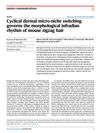Timing of Expression of the Core Clock Gene Bmal1 Influences Its Effects on Aging and Survival
February 2016
in “
Science Translational Medicine
”

TLDR The timing of when the gene Bmal1 is active affects aging and survival, with its absence during development, not adulthood, leading to premature aging.
The study by Yang et al. from February 3, 2016, explored the role of the core clock gene Bmal1 in aging and survival by using conditional Bmal1 knockout mice that lacked BMAL1 protein during their adult life. The results showed that these mice did not experience a shortened lifespan, infertility, reduced body weight, or impaired glucose homeostasis, which are common in conventional Bmal1 knockout mice. However, they did exhibit improved atherosclerosis and hair growth, despite the loss of circadian rhythms. The study also suggested that many aging-related phenotypes previously associated with circadian rhythm disruption might actually be due to BMAL1 functions that are independent of its role in the clock. This indicates that the timing of Bmal1 expression is crucial, as its absence during development, rather than in postnatal life, may lead to premature aging. The study involved a significant number of mice in various tests (e.g., n = 8 to 9 for wheel-running activity, n = 25 for lifespan, n = 23 for fertility), supporting the robustness of the experimental design and findings.



